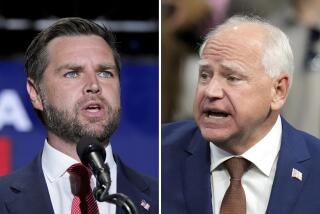NEWS ANALYSIS : Clinton Sails Clearly Ahead in Format’s Familiar Waters : Debates: Bush lost another chance to pull an upset while Perot’s quips seemed a bit dusty this time.
- Share via
WASHINGTON — In full command of himself and a broad range of issues, front-running Democratic presidential candidate Bill Clinton turned in a performance Thursday night that toughened the task faced by President Bush and independent candidate Ross Perot in trying to catch up with him.
“Nothing happened to change the basic structure of the race,” said Lee M. Miringoff, an independent New York pollster who heads the Marist Institute for Public Opinion. “Clinton went in ahead and he came out ahead.”
Before the debate began, Clinton’s aides noted that the Arkansas governor had ample experience with the format, in which the three candidates fielded questions from members of the audience. And his performance showed it.
“Clinton is just a star in that format,” said University of Texas communication professor Roderick Hart. “He was direct and personal.”
By contrast, Bush seemed to face the same dilemma that plagued him in the first debate Sunday night: He had to defend the dismal condition of the nation’s economy and explain how he now would improve it. While Bush valiantly promoted his recently unveiled agenda for economic renewal, he lost a precious opportunity to rebut the frequently heard criticism that he is too remote from the real concerns of the citizenry.
When one audience member asked how the candidates knew what citizens suffering from the recession were going through, Bush seemed at a loss for words. He wound up inviting her to watch him deal with the economy in the White House.
As for Perot, whose homespun wisecracks made a big hit in the first debate, he seemed to run out of fresh material Thursday night.
“Perot was not as funny,” said Cliff Zukin, a professor at Rutgers University’s Eagleton Institute of Politics. “Some of those jokes seemed tired the second time around.”
And Perot seemed nonplussed when moderator Carole Simpson told him: “Everybody thinks you won the first debate because you were plain-speaking and you made it sound oh-so-simple. What makes you think that you’re going to be able to get the Democrats and Republicans together any better than these guys (Clinton and Bush)?”
In response, Perot began talking about creating jobs in the inner city, until Simpson, who at times sought to instill some cohesion in the largely unstructured and often disjointed nature of the debate, cut him off and asked pointedly: “Are you answering my question?”
“If they would talk to one another instead of throwing rocks, I think we could get a lot done,” Perot said finally. “I doubt if they’ll give me the chance, but I will drop everything and go work on it.”
Bush, gamely striving to close Clinton’s lead in the polls, sought to deflate an effective gambit that the Arkansas governor had employed in last Sunday’s debate. Clinton, in denouncing Bush’s criticism of his involvement in peace demonstrations held overseas during the Vietnam War as “McCarthyism,” had invoked the name of the President’s father, Prescott Bush.
The elder Bush, then a senator from Connecticut, was among the first Republicans to take a public stand against the red-baiting tactics of Sen. Joseph R. McCarthy of Wisconsin in the early 1950s, Clinton noted.
Not only was Bush’s comeback four days late, but it was so complicated and labored that it was difficult to follow.
Clinton “raised the question of my father,” Bush said. “It was a good line, well rehearsed and well delivered.” Then the President recalled his father’s advice to him as he left for Navy service in World War II--”write your mother, serve your country and tell the truth”--to defend his own use of the so-called character issue against Clinton in the campaign.
Bush again briefly mentioned Clinton’s opposition to the Vietnam War. “I am deeply troubled by someone who demonstrates and organizes demonstrations in a foreign land when his country is at war.”
He added: “The big argument that I have with the governor on this is this taking different positions on different issues . . . what we call waffling.”
Then Bush finally arrived at what was obviously designed as the punch line of his rejoinder: “I do think that you can’t turn the White House into the ‘Waffle House.’ You’ve got to say what you’re for.”
Clinton, mindful that the “waffling” criticism has been directed at him throughout much of the campaign--including by fellow Democrats during the primary season--seemed determined to rebut it with his debate performance Thursday night.
Asked by an audience member if he would “enter into a legally binding contract with the American people” not to seek a second term if he did not achieve his deficit reduction goals, Clinton never blinked an eye before answering: “No, and here’s why . . .”
After outlining his deficit reduction proposals, he said: “But I can’t foresee all the things that will happen, and I don’t think a President should be judged solely on the deficit.
He also reminded the audience that there would be another presidential election in 1996. “You’ll have a shot at me in four years,” Clinton said, “and you can vote me right out if you think I’ve done a lousy job.”
Today on the Trail . . .
Gov. Bill Clinton campaigns in Richmond, Va., Baton Rouge and New Orleans, La.
President Bush campaigns in Edison and Somerset, N.J.
Ross Perot has no public events scheduled.
TELEVISION
Ross Perot airs a new 30-minute commercial on NBC at 10:30 p.m. PDT.
James B. Stockdale is a guest on C-SPAN’s “Road to the White House” at 6:30 p.m. PDT.
More to Read
Get the L.A. Times Politics newsletter
Deeply reported insights into legislation, politics and policy from Sacramento, Washington and beyond. In your inbox twice per week.
You may occasionally receive promotional content from the Los Angeles Times.










